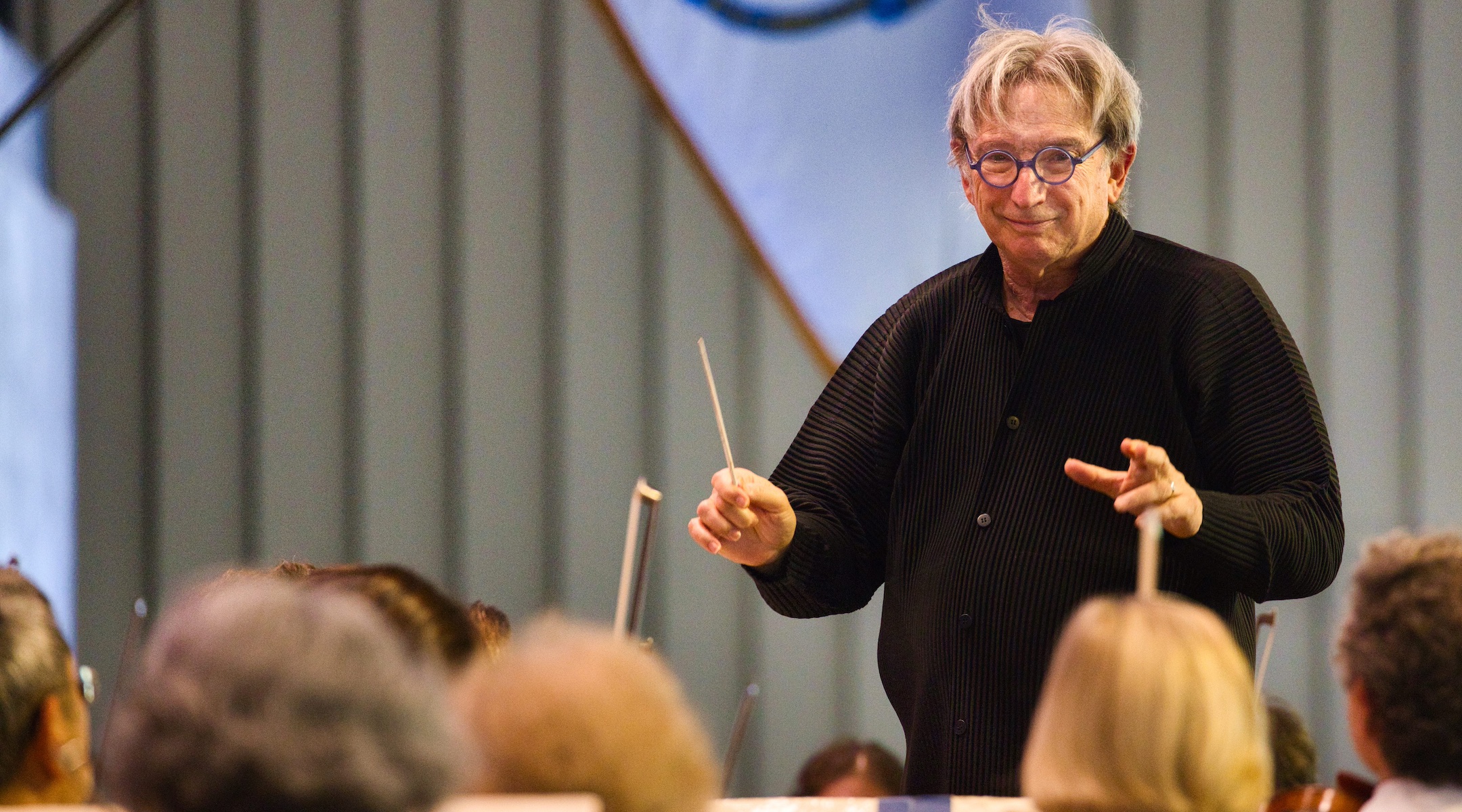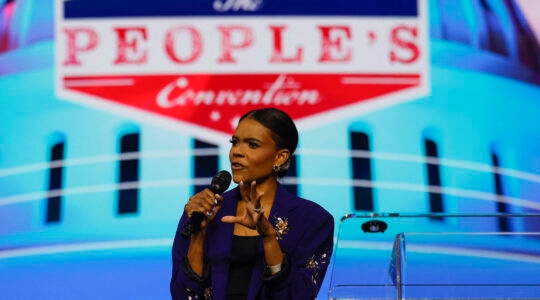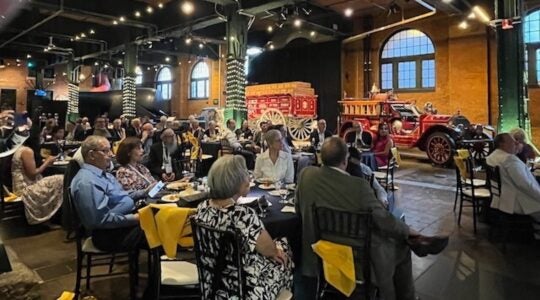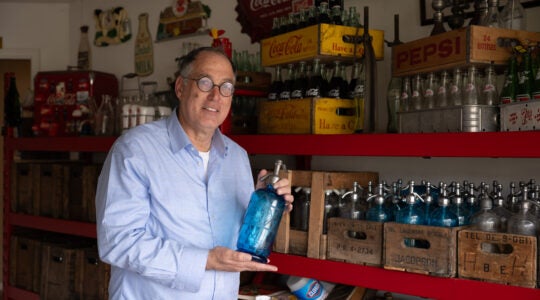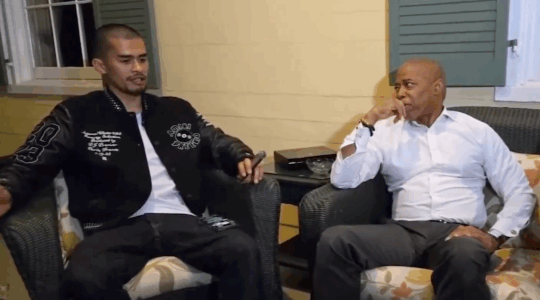Half a century ago, in the fall of 1969, Michael Tilson Thomas — a promising, young conductor and scion of Yiddish theater royalty — lifted his baton for his New York debut with the Boston Symphony Orchestra, where he had recently been appointed assistant conductor and pianist.
In one of those rare unscripted moments, Tilson Thomas was tapped to take the place of William Steinberg, the orchestra’s music director, who had fallen sick mid-concert.
The widely acclaimed performance by the then 24-year-old catapulted Tilson Thomas onto the world stage.
There was no turning back from his meteoric rise, and Tilson Thomas spent the next decades conducting some of the world’s most prestigious orchestras.
For a quarter-century, Tilson Thomas, the ebullient grandson of Jewish-Ukrainian immigrants who became stars of New York City’s vibrant Yiddish theater scene, served as music director of the San Francisco Symphony, where, for the last five years, he’s been music director laureate.
Later this month, on April 26, the acclaimed 12-time Grammy-winning maestro will raise his baton with the SFS in a concert to celebrate his 80th birthday, which fell last December.
The concert will be Tilson Thomas’s last public performance, a notable evening that will surely evoke bittersweet emotions for audiences that still see him as an ambassador for classical music, mentor to budding musicians and proud heir of his Jewish heritage.
Two months ago, Tilson Thomas announced that, after three years in remission, his aggressive form of brain cancer had returned.
“Now is the time to wind down my public appearances,” he wrote, in a heart-tugging message that he posted on his website. Following the performance with the SFS, he wrote: “We all get to say the old show business expression, ‘It’s a wrap.’”
“Life is precious,” he signed off.
Tilson Thomas expressed gratitude for the fulfilling life he has led, one that he shares with his husband, Joshua Robison. The couple met in middle school and have been together for nearly 50 years.
“A coda is a musical element at the end of a composition that brings the whole piece to a conclusion,” he noted. “A coda can vary greatly in length. My life’s coda is generous and rich.”
In the course of his career, Tilson Thomas has embraced his Jewish roots and identity through a diverse array of compositions including “From the Diary of Anne Frank,” commissioned in 1969 by UNICEF for the actress Audrey Hepburn.
In 2018, he composed and conducted “Grace,” an 80th-birthday tribute to his mentor and colleague, Leonard Bernstein, another Jewish wunderkind to whom he was often compared. He conducted the narrated piece with the BSO, at Tanglewood in Western Massachusetts.
His most well known project with Jewish themes is “The Thomashefskys: Music and Memories of a Life in the Yiddish Theater.”
It’s an homage to his immigrant grandparents, Boris and Bessie, who, in the early years of the 20th century became trailblazing performers and producers of Yiddish theater on New York’s Lower East Side.
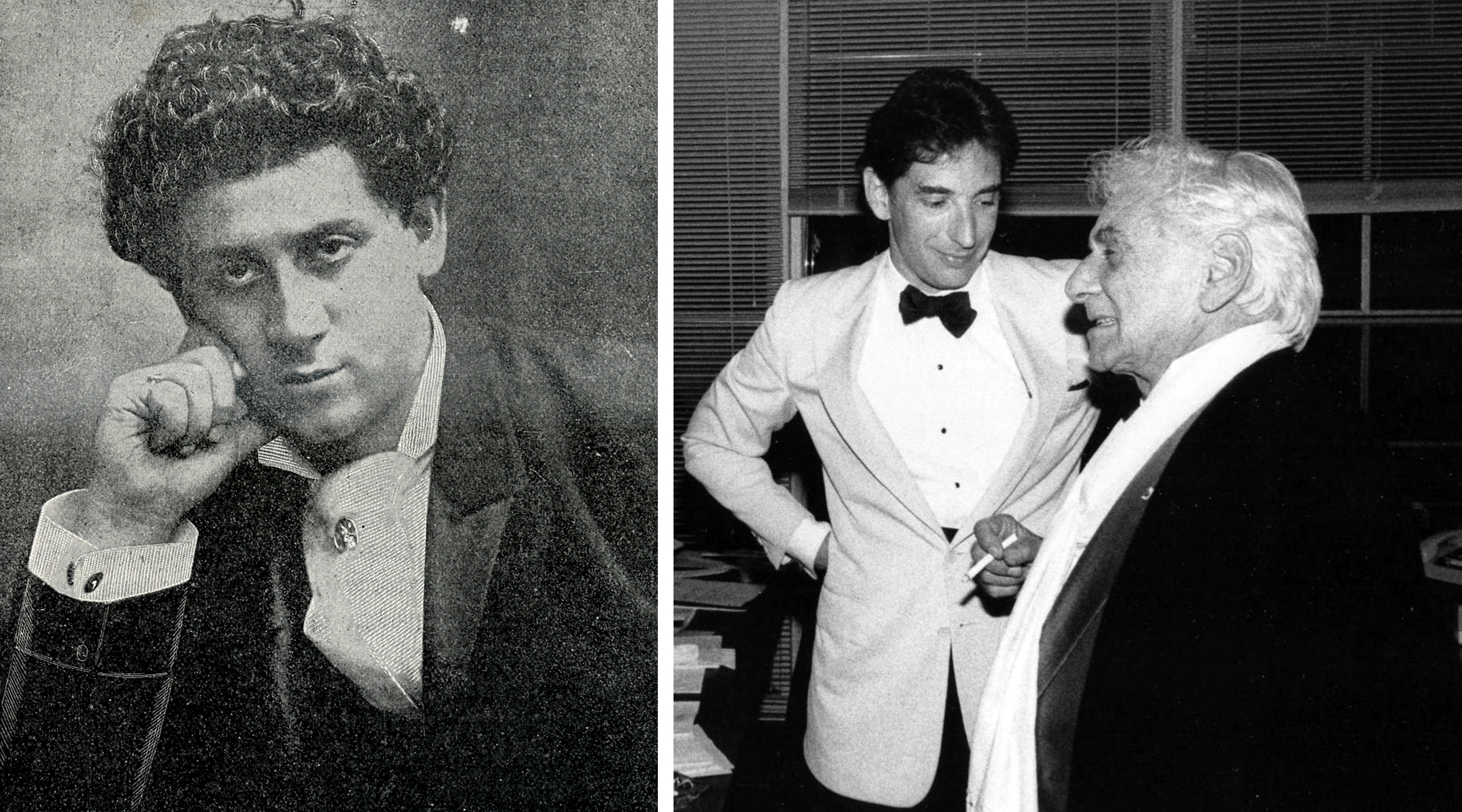
Boris Thomashefsky, left, the grandfather of Michael Tilson Thomas, was with his wife Bessie a titan of the Yiddish theater; at right, Tilson Thomas with his mentor, Leonard Bernstein, in 1988 at Tanglewood, the summer home of the Boston Symphony Orchestra, where both musicians conducted and taught throughout their careers. (Wikipedia; Walter Scott/Courtesy Boston Symphony Orchestra)
“My grandparents became megastars, in their new country. The Yiddish theatre was central to their lives,” Tilson Thomas wrote. “The Thomashefskys,” performed internationally, expressed Tilson Thomas’s pride in his Jewish roots, according to Joshua Jacobson, founder and artistic director of Zamir Chorale of Boston and a scholar of Jewish music.
“He wasn’t hiding the fact that he is Jewish. In fact, he was doing programs about it,” Jacobson said.
In 1987, Tilson Thomas launched the New World Symphony in Miami; his vision was to create an orchestra that offered young musicians an opportunity to navigate the transition between their academic studies and establishing their careers. He now serves as its artistic director laureate.
Such career transitions were a widely acknowledged problem, according to Howard Herring, the orchestra’s CEO.
“Michael had a solution — the concept that became the New World Symphony,” Herring wrote in an email.
The strength of the idea attracted the attention of Ted and Lin Arison, Jewish philanthropists and supporters of the arts who became the orchestra’s co-founders. (Ted Arison, an Israeli businessman who made his fortune in cruise lines, died in 1999.)
That same year, in 1987, Tilson Thomas made the first of two tours of Israel — spearheaded by the Arisons and their foundation — conducting the Israel Philharmonic. He next conducted there in 2018, for the celebration of the nation’s 70th anniversary.
Many consider his passion for nurturing new generations of musicians among his most enduring legacies. Among them is Teddy Abrams, the conductor of the Louisville Orchestra, who studied with Tilson Thomas in the early years of his career.
Abrams, who is Jewish, credits Tilson Thomas with encouraging him to pursue his childhood dream of becoming a conductor, when Abrams was just 9 years old.
He went on to study with the maestro, who became his mentor.
They’ve remained as close as family, Abrams said last month at Boston’s Symphony Hall, when the 37-year-old made his debut with the BSO, conducting Leonard Bernstein’s Symphonic Dances from “West Side Story” on the stage where Tilson Thomas started his career.
“He’s one of the most important educators alive,” Abrams said.
For both Abrams and Tilson Thomas, their Jewish identities are cultural, through music, going back generations. Their families were both from Eastern Europe, Hungary and Russia.
Among Tilson Thomas’s Jewish-themed compositions, Abrams is most drawn to “From the Diary of Anne Frank.”
“It’s a standout masterpiece. It is extremely powerful. I hope it’s a piece that everybody gets a chance to hear, especially in these times. I think it will be one of his major legacy works,” said Abrams, who recently steered the Louisville Orchestra to perform an opera that its former concertmaster once performed in a Nazi concentration camp.
As Tilson Thomas’s public performances draw to a close, Abrams sees the deep satisfaction his friend and mentor is experiencing in his work.
“Being on the podium is where he belongs. I think he’s at his personal happiest,” Abrams reflected. “There’s no pressure. He is making music in the purest sense. I can see how much joy that brings him.”
JTA has documented Jewish history in real-time for over a century. Keep our journalism strong by joining us in supporting independent, award-winning reporting.
